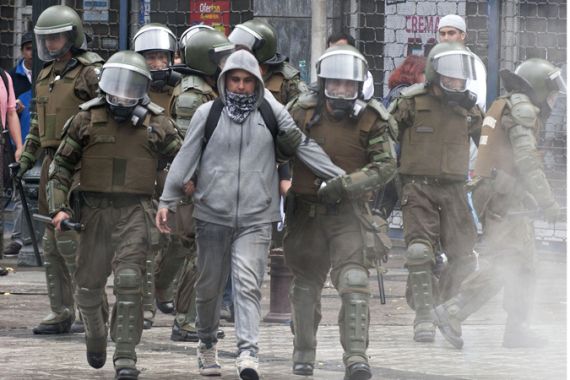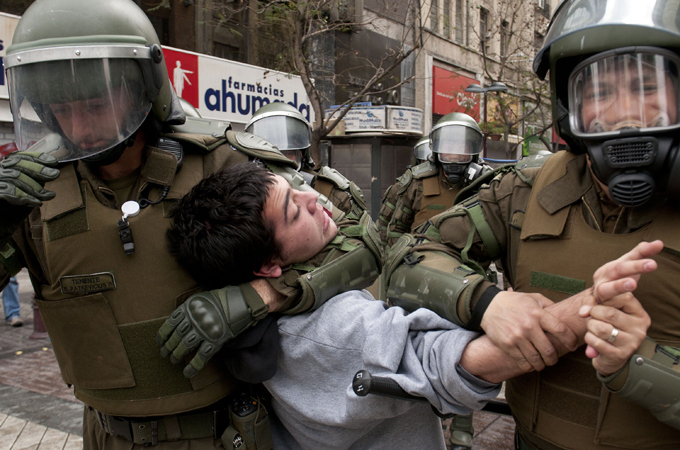Chilean students protest after ‘failed talks’
Thousands march through the streets of Santiago after their demands for education reform go unmet.

 |
| Camila Vallejo, spokeswoman for student leaders, called the violence at Thursday’s protest unprecedented [AFP] |
Thousands of students have marched in the streets of the Chilean capital after talks between their representatives and government officials failed to meet students’ demands.
Several people, including reporters, were injured in Thursday’s march after police tried to disperse the protesters in Santiago’s Plaza Italia using water cannons and tear gas.
Keep reading
list of 4 items‘We share with rats’: Neglect, empty promises for S African hostel-dwellers
Thirty years waiting for a house: South Africa’s ‘backyard’ dwellers
Photos: Malnutrition threatens future Afghan generations
Camila Vallejo, the spokeswoman for leaders of students at 25 state universities, called the violence unprecedented, even after five months of confrontations between students and police.
The protest comes one day after a five-hour-long meeting with Felipe Bulnes, the education minister, in an attempt to put an end to the almost daily protests over education-related reforms.
But Vallejo said that government officials showed “no real willingness to build a free public education, of quality and democracy for everyone”.
“They keep backing the same model where the market rules, where the funding goes to private universities first through subsidies, scholarships, vouchers, loans and more debts [for the students] and all that, we will not tolerate.”
Bulnes, the education minister, said that the two sides “have made no major progress” because of disagreements on how much the government can do to provide free education for everyone.
He said the government would form a commission of experts to examine the issue.
Profit-driven system
Tensions were high even before the student leaders and government officials sat down, after Sebastian Pinera, the country’s president, said he was sending a bill to Congress that would criminalise the students’ protests.
The students say Chile’s education system is profit-driven and provides poor instruction.
They say they want to make higher education more accessible with expanded scholarship programmes for poor students funded in part by higher taxes on the wealthy.
College costs in Chile are considered the most expensive in the Western Hemisphere, after the United States.
A student’s family must contribute 85 per cent of university expenses, while the government provides 15 percent.
Only the poorest students get a nearly free education, through scholarships, grants and low-cost loans.
Pinera’s government says it cannot afford to provide such support for all students.
But students claim that Pinera is doing a poor job of distributing wealth from a copper price boom.
Pinera, a billionaire businessman who has seen his approval ratings fall dramatically since the protests, had said he prioritised education in the next year’s budget.